Each month, GCSE spotlights one Member organization and the importance of sustainability at the institution and the institution's role in informed environmental decision-making.
October 2020: The University of Arizona
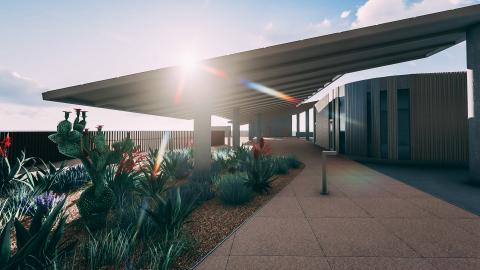
The University of Arizona (UArizona) in Tucson, Arizona, has been an NCSE Member for 15 years and takes a truly transdisciplinary approach to environmental research. Through university-wide and college-level research institutes and centers that bring together and connect their outstanding environmental faculty to tackle the world’s grand challenges, UArizona seamlessly incorporates the expertise and needs from Arizona communities, industry, and government stakeholders. The breadth of environmental research and academic programs at UArizona spans focus areas from environmental economics and business systems to arts and humanities to environment and public health to water resources—and many more.
The UArizona Office for Research, Innovation and Impact recently formed the Arizona Institutes for Resilience, or AIR. AIR is a “constellation” of 11 institutes, cCenters, and pPrograms that, in aggregate, aim to better understand environmental challenges and to develop solutions that tangibly improve people’s resilience in the face of environmental shocks, including those due to impacts of climate change. The UArizona’s Office of Sustainability focuses on sustainability efforts that are environmentally sound, socially just, and economically viable across the university campus and broader community. This includes Compost Cats, one of the longest-running student sustainability programs at the university.
UArizona faculty and student researchers work alongside community partners to offer decision-makers the most forward-thinking strategies to combat the climate crisis and other environmental challenges. Through the University Climate Change Coalition, AIR builds on the university’s role as a land-grant university, exemplifying sustainable practices and social and environmental justice, enabling innovation, and taking science-based solutions into the real world to prepare for a new era of environmental realities.
Did You Know? The LEED-platinum certified Environment and Natural Resources 2 (ENR2) building on the university campus is currently transforming its roof to an agrivoltaic green roof, integrating photovoltaic energy and agricultural production to improve both solar panel efficiency and plant production.
September 2020: University of Alaska Fairbanks
University of Alaska Fairbanks (UAF) has been an NCSE member for four years. UAF is a small university making large contributions to sustainability. Research and teaching at UAF informs decisions on environmental issues spanning geographies, cultures, and generations. The school takes advantage of its small size to knit together disciplines and ways of knowing in powerful ways. Like any university, UAF has diverse departments and programs, but the boundaries are porous and internal and external collaborations contribute to informing environmental policies.
The geographical breadth of issues such as climate change requires international collaboration as manifested, for example, by UAF’s International Arctic Research Center. The cultural implications of environmental changes and decisions, of course, must be understood across disciplines and diverse knowledge systems, and UAF brings together academic and Indigenous scholars through its College of Rural and Community Development and the Alaska Climate Adaptation Science Center’s Tribal outreach efforts and other programs.
UAF’s Office of Sustainability was founded by students and today is entirely student-funded, driven by a student-led board, and programs are run by students. Using this model UAF students run a campus recycling program with over 100 bins, a bike rental program with a fleet of around 120 bikes, a FreeStore, a campus repair cafe, a student gardener training program, a campus food bank, and an Office of Sustainability that provides resources, education, and programming for the campus and greater Fairbanks community. Close collaboration across these and other University of Alaska programs helps to ensure that today’s decisions meet society’s needs without compromising the needs of future generations, the very definition of sustainability.
Did You Know? The student sustainability board has selected over 90 (mostly student) projects for funding, coordinated the development of a campus sustainability plan, and established a Green Revolving Fund.
August 2020: Instituto Tecnológico de Santo Domingo
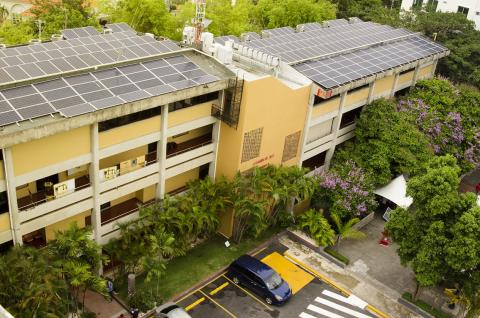 At the Instituto Tecnológico de Santo Domingo (INTEC) in the Dominican Republic, sustainability and environmentally responsible decision-making are cross-cutting to all institutional work. Through the current Campus Sostenible program, they reformed all procurement processes to ensure that their suppliers share their values. Additionally, they have developed an ongoing educational campaign aimed at the members of their community and visitors. They also maintain a recycling program and weigh their waste to monitor results.
At the Instituto Tecnológico de Santo Domingo (INTEC) in the Dominican Republic, sustainability and environmentally responsible decision-making are cross-cutting to all institutional work. Through the current Campus Sostenible program, they reformed all procurement processes to ensure that their suppliers share their values. Additionally, they have developed an ongoing educational campaign aimed at the members of their community and visitors. They also maintain a recycling program and weigh their waste to monitor results.
INTEC has been an NCSE Member for one year. The university has designed cross-curricular coursework for all careers and programs oriented to conservation and sustainability issues. Additionally, researchers at INTEC are involved in various projects in the energy area. They have three research groups focused on Energy Efficiency, Renewable Energy, and Energy Planning. As an additional contribution to the Dominican Republic on these issues, they have developed the country’s first doctoral programs in Environmental Sciences and Energy Management for Sustainable Development.
The university also leads by example at the country-level. The campus models conservation practices and pioneers in renewable energy. For example, there are more than 1,400 solar panels on campus. These panels cover 90 percent of the campus building rooftops and yield impressive energy efficiency results.
Did You Know? Every year, INTEC prevents the emission of more than 420 tons of carbon dioxide (CO2) into the atmosphere and generates up to 20 percent of its total energy consumption in clean energy. This is the highest figure available of impact for the education sector in the Dominican Republic.
July 2020: George Mason University
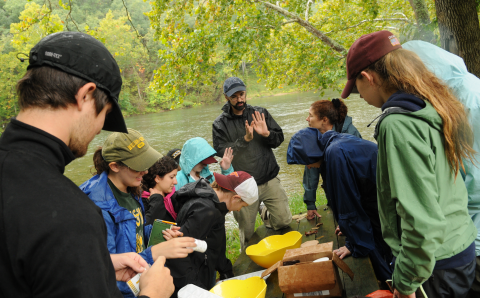
George Mason University has been an NCSE Member Institution for 14 years. Sustainability is a key educational, operational and research priority at Mason. Mason educates sustainability leaders, conducts interdisciplinary research of consequence, invests in green infrastructure, and promotes and supports socially conscious entrepreneurship. Through civic and community engagement in and outside the classroom, Mason offers students a transformative education in programs based within the Department of Environmental Science and Policy (ESP), Atmospheric, Oceanic, and Earth Sciences, Global and Community Health, and the School of Integrative Studies, among others. Mason’s globally-recognized faculty deliver high-level educational experiences, field applications, and leadership in extension and outreach, within one of the most diverse academic communities in America. Building upon strong foundational partnerships and its convenient location, their programs address local, regional and global environmental issues, translating science into policy.
ESP embraces ecosystem health and sustainability as a research and academic focus under the One Health/Planetary Health approaches, demonstrating solutions to pressing issues to policymakers and the general public. ESP focuses on conservation of species and their habitats; ecology of water and watersheds; monitoring and management of environmentally-derived emerging infectious diseases; and the sustainability of socio-ecological systems that support healthy humans, species, and ecosystems. The department delivers 125 “green leaf”-designated sustainability courses across dozens of academic programs. Mason students have directly offered hands-on watershed education programs to over 100,000 middle school youth.
Nine of Mason’s colleges and schools also support research centers that focus on sustainability, including the Potomac Environmental Research and Education Center, the Center for Climate Change Communication, the Business for a Better World Center, and the Center for Energy Science and Policy. With much of its research related to sustainability, Mason recently launched the Institute for a Sustainable Earth to connect faculty with policymakers, businesses, civic organizations, and communities to foster transdisciplinary research. Mason’s Center for Resilient and Sustainable Communities facilitates locally led, bottom-up initiatives supported by effective, replicable models.
The Office of Sustainability provides leadership in environmental, social, and economic stewardship on our campuses and throughout the local and global communities. Mason is committed to achieving carbon neutrality no later than 2050. The Patriot Green Fund has financially supported more than 70 student-led projects, including the first four hives of what became the Honey Bee Initiative (HBI); HBI is managed by the Business for a Better World Center and now has more than 800 hives around the world! Recently, HBI’s work in Colombia was selected as the 15th best overall social and environmental project in Latin America. On campus, students may participate in the Green Residence program, work in the hydroponic greenhouse that supplies microgreens to campus diners, and live in the Environment and Sustainability Living Learning Community.
Did You Know? Mason students can spend a semester at the Smithsonian Conservation Biology Institute. This one-of-a-kind Smithsonian-Mason School of Conservation partnership offers residential programs with Smithsonian scientists where students care for endangered animals and learn how to protect vanishing ecosystems and species.
June 2020: Seminole State College of Florida
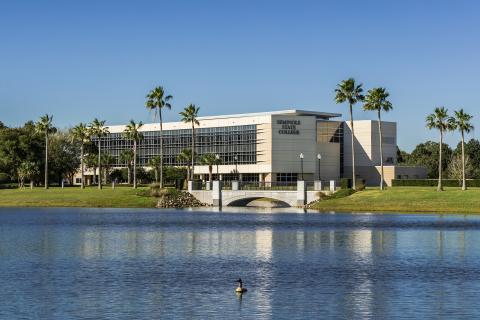 Seminole State College of Florida is a full-service education provider within the Central Florida community, offering a wide range of two-year college-credit degrees, bachelor’s degrees, career and technical certificates, adult education, and professional educator preparation. Seminole State College has been an NCSE Member for seven years and has contributed to the Community College Handbook for Sustainability Education and Operations.
Seminole State College of Florida is a full-service education provider within the Central Florida community, offering a wide range of two-year college-credit degrees, bachelor’s degrees, career and technical certificates, adult education, and professional educator preparation. Seminole State College has been an NCSE Member for seven years and has contributed to the Community College Handbook for Sustainability Education and Operations.
Global sociocultural responsibility is considered a key learning outcome at Seminole State College, and the institution has taken many efforts to introduce sustainability across the curriculum. Among these programs, Seminole State offers a unique multidisciplinary Sustainability Certificate, with course options available to first- and second-year undergraduates in fields as diverse as renewable energy, green building, alternative fuels, sustainable business, and environmental policy. Students pursuing degrees in engineering technology may seek a specialization in sustainable engineering, while business graduates may now complete an additional Certificate of Professional Preparation in Sustainability Management. Founded on relationships made through NCSE and supported through generous grants, an ongoing travel study program for women in STEM, Sustainability Studies in the New Mexico High Desert, is also offered at Seminole State.
Seminole State College continues to seek opportunities to improve the sustainability of its operations and to promote the long-term social, economic, and environmental wellness of the college and the community. Seminole State’s newly established collegewide Sustainability Committee has been tasked with articulating a new vision for sustainability at the institution and for developing the College’s first ever comprehensive Sustainability Plan.
Did You Know? Last year Seminole State College’s sustainability program launched an exciting partnership with the Center for Fine & Performing Arts. Technical theatre students enrolled in a special topics course on Green Theatre & Sustainable Design. In tandem, the College hosted its Fix It Up! Art & Repair Fair, a community event that featured multiple workshops, a Student Recycled Art Show, a panel discussion on green theatre in Central Florida, and a guest lecture on future prospects for a circular economy.
May 2020: Universidad del Desarrollo
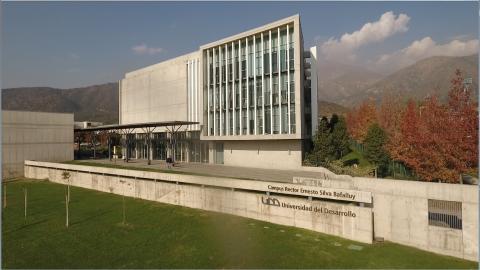 Universidad del Desarrollo (UDD) is one of the first NCSE Member Institutions in the International Network, joining in 2019. UDD is one of the most modern and fast growing universities in Chile. Founded in 1990, it has become one of the best academic institutions in the country for undergraduate, postgraduate, and other studies, and is also recognized for its research centers and programs in several fields. UDD is a dynamic and young university that aims to contribute solutions to society’s problems with quality, security, and efficacy, now and in the future. UDD researchers are involved in high-impact research and adapt effectively in a dynamic international context to attract collaboration from all over the world. UDD aims to achieve strategic alliances with international centers that have a high level of scientific productivity and impact in innovation.
Universidad del Desarrollo (UDD) is one of the first NCSE Member Institutions in the International Network, joining in 2019. UDD is one of the most modern and fast growing universities in Chile. Founded in 1990, it has become one of the best academic institutions in the country for undergraduate, postgraduate, and other studies, and is also recognized for its research centers and programs in several fields. UDD is a dynamic and young university that aims to contribute solutions to society’s problems with quality, security, and efficacy, now and in the future. UDD researchers are involved in high-impact research and adapt effectively in a dynamic international context to attract collaboration from all over the world. UDD aims to achieve strategic alliances with international centers that have a high level of scientific productivity and impact in innovation.
UDD graduates should be able to devise new and different solutions to solve complex problems and address situations with a changing context. UDD future professionals should be driven by the impact of their achievements and be able to lead others as well as collaborate with them. UDD faculty have a strong involvement as experts or members of advisory boards of governmental institutions, such as National Agency of Research and Development, National Commission in Innovation and Development (CNID), Ministry of Finance, Ministry of Environment, Ministry of Energy, and the Chilean delegation for COP21. Faculty also contribute to the IPCC Sixth Assessment Report (AR6) and the 2019 Global Sustainable Development Report (GSDR).
At an international level, the university is a member of United Nations Sustainable Development Networks (UNSDN), Network for Business Sustainability, the Committee on World Food Security (CFS), Food and Agriculture Organization (FAO), and International Water Research Association. UDD also contributes to Future Earth, an international research program for global sustainability working on the water-energy-food security nexus.
Did You Know? As part of the Public Responsibility Week, UDD celebrates a “Sustainability Day,” in which students and faculty can learn more of the sustainability initiatives, such as recycling points, solar chargers for mobile devices and special parking for bicycles. In addition, a farmer’s market is held every other week at the campus, where the UDD community can buy fresh vegetables and fruits. UDD has many diverse initiatives that improve the quality of life in the three major dimensions of Sustainable Development: economic, social, and ecological. UDD is the second institution in Chile in The Times Higher Education Impact Rankings (second edition), the only global performance tables that assess universities against the United Nations’ Sustainable Development Goals (SDGs).
April 2020: The University of Texas Rio Grande Valley
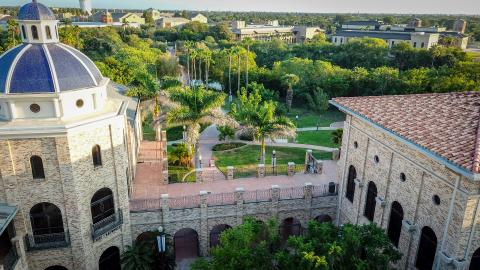 The University of Texas Rio Grande Valley (UTRGV) has been an NCSE Member for three years. Created by the Texas Legislature in 2013 as the first major public university of the 21st century in Texas, this transformative initiative provided the opportunity to expand educational opportunities in the Rio Grande Valley, located along the U.S.-Mexico border in one of the most underserved regions of the country. UTRGV has been named a CollegeNET Social Mobility Innovator for its success in making college affordable, advancing economic opportunity, and providing opportunities for its students to make a positive impact in their lives and on their community, such as through various research centers including those for nanotechnology, space, coastal and climate change research, and entrepreneurial and economic growth. A new School of Medicine, which will graduate its first class in 2020, also contributes to the health of the region’s populace and advances research on diabetes and infectious diseases that disproportionately affect the Rio Grande Valley. Across the Rio Grande Valley, students and faculty wholeheartedly engage in applied community-engaging and sustainable development research to the extent that the university was awarded the Carnegie Community Engagement Classification for 2020.
The University of Texas Rio Grande Valley (UTRGV) has been an NCSE Member for three years. Created by the Texas Legislature in 2013 as the first major public university of the 21st century in Texas, this transformative initiative provided the opportunity to expand educational opportunities in the Rio Grande Valley, located along the U.S.-Mexico border in one of the most underserved regions of the country. UTRGV has been named a CollegeNET Social Mobility Innovator for its success in making college affordable, advancing economic opportunity, and providing opportunities for its students to make a positive impact in their lives and on their community, such as through various research centers including those for nanotechnology, space, coastal and climate change research, and entrepreneurial and economic growth. A new School of Medicine, which will graduate its first class in 2020, also contributes to the health of the region’s populace and advances research on diabetes and infectious diseases that disproportionately affect the Rio Grande Valley. Across the Rio Grande Valley, students and faculty wholeheartedly engage in applied community-engaging and sustainable development research to the extent that the university was awarded the Carnegie Community Engagement Classification for 2020.
Coordinated by the UTRGV Office for Sustainability, UTRGV offers a Sustainability Fellowship program in which masters students carry out impactful sustainability and community resilience projects. UTRGV also recently launched a new Sustainability Graduate Student Leadership program in partnership with the Office of Professional Education and Workforce Development which aims to scale the impact students make towards communities’ sustainable development, providing leadership training and support for collaboration. Sustainability Faculty Fellows contribute their expertise to these programs.
Did You Know? The University of Texas Rio Grande Valley is an AASHE designated International Center for Sustainability Across the Curriculum and one of only five universities in Texas to receive an AASHE Gold Rating for overall efforts to integrate sustainability across the university. UTRGV’s commitment to maintaining a sustainable environment on campus is also evident through its Tree Campus USA and Bee Campus USA designations, both informed by their faculty and student researchers.
March 2020: Long Island University
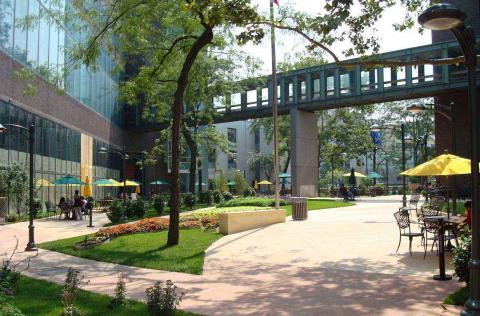
Long Island University (LIU) is advancing as a leading institution in producing research that bridges environmental and health sciences, while educating students for a sustainable future economy. LIU has been an NCSE Member for three years. Two of the University’s signature research areas—One Health and Resilient Communities—highlight LIU’s awareness and commitment to finding solutions to some of the greatest challenges facing humanity today. Leveraging its proximity to the United Nations’ headquarters, LIU has aligned several of its courses’ learning objectives and extracurricular programs with the UN’s Sustainable Development Goals, while faculty across multiple disciplines are producing high-level, federally and privately funded research in climate science, public health, the social sciences, and humanities.
Did You Know? The Campus Urban Sustainability Program (CUSP)—a program funded by the National Endowment for the Humanities, in collaboration with the Director of the Honors College, a fellow of the Theodore Roosevelt Institute of LIU (dedicated to one of the founders of conservation in the U.S.)—have recruited a leading environmentalist for the 50th anniversary celebration of Earth Day this April (the speaker’s identity will be revealed soon).
February 2020: Louisiana State University
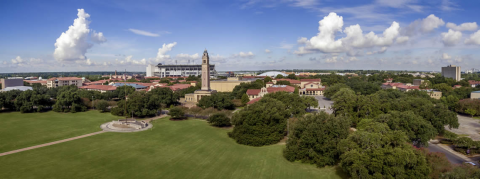
Louisiana State University (LSU) has been an NCSE Member for 12 years. LSU’s proximity to the banks of the Mississippi River and the fastest disappearing coastline in the continental U.S. contributes to its unwavering commitment to environmental sustainability. As an R1 university in the Carnegie Higher Education Classification, LSU’s research productivity places the university in the top 3% of higher education institutions in the U.S. As a land-, sea-, and space-grant institution, LSU is globally known as a leader in coastal and environmental research and education.
LSU continually strives to demonstrate efficient and environmentally responsible activities, operations, and education by incorporating sustainable living and recycling into campus operations and events. The university promotes sustainable practices both on and off campus, provides resources and support for those who wish to incorporate sustainable practices in their work and life, and advocates for sustainable programs and initiatives. Their goals include increasing campus-wide recycling, decreasing energy usage in buildings, incorporating green and sustainable alternatives in building design, and promoting alternative fuels/modes of transportation.
Did You Know? LSU’s commitment to sustainability reaches all corners of its campus. In fact, LSU’s Landscape Services Department has achieved Tree Campus USA designation for the past several years in a row by using a proactive and aggressive approach to planting trees on university grounds. More than 250 new trees have been planted since 2013, and there are currently 5,000 mature trees of various species around campus.
January 2020: Northern Arizona University
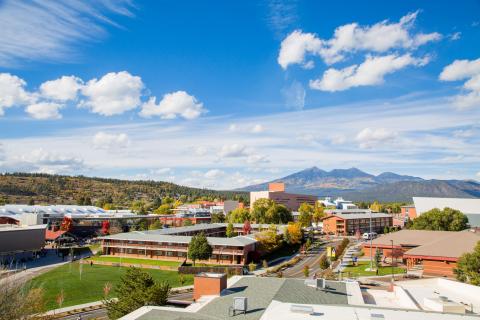 Northern Arizona University (NAU) has been an NCSE Member Institution for 13 years.
Northern Arizona University (NAU) has been an NCSE Member Institution for 13 years.
NAU has built an international reputation for environmental and sustainability research through its world-class programs in ecosystem science, earth sciences, forestry, restoration ecology, land management, and sustainability. From its Flagstaff campus in Northern Arizona at an elevation of 7,000 feet, NAU faculty focus on the unique natural and cultural resources of the region to mentor students as they conduct research on the Colorado Plateau beyond the classroom and lab settings.
Ranked #201 in the U.S. by the National Science Foundation in its latest research rankings—and #93 among universities without a medical school—NAU is home to many multidisciplinary institutes and programs focused on environmental and sustainability research, restoration, and land management, including the Center for Ecosystem Science and Society, the Ecological Restoration Institute, the Landscape Conservation Initiative, the Merriam-Powell Center for Environmental Research, and the Institute for Tribal Environmental Professionals. The university has also formed major partnerships with other institutions to accomplish its goals in these areas, such as the Partnership for Native American Cancer Prevention and the Colorado Plateau Cooperative Ecosystems Studies Unit.
NAU is regularly recognized on the Sierra Club’s Coolest Schools list and maintains a gold rating in the AASHE STARS program. Campus programs in sustainability include student-driven behavior change initiatives such as the 120+ Energy Mentor Program, a Green Office Certification Program, and a Sustainable Citizen Program available for all majors.
Did You Know? The NAU community launched the Ponderosa Project in the 1990s to support an interdisciplinary group of faculty to incorporate environmental sustainability into university curricula. The initiative is still active today as the Environmental Caucus Action Teams, an informal grassroots group of students, faculty, staff, and community members developing and promoting sustainability education, research, operations, and outreach.